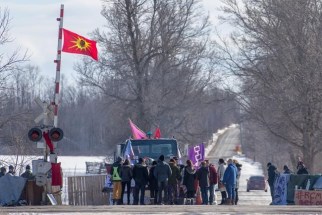Blockades, brickbats and democratic building blocks
Read this article for free:
or
Already have an account? Log in here »
To continue reading, please subscribe:
Monthly Digital Subscription
$19 $0 for the first 4 weeks*
- Enjoy unlimited reading on winnipegfreepress.com
- Read the E-Edition, our digital replica newspaper
- Access News Break, our award-winning app
- Play interactive puzzles
*No charge for four weeks then billed as $19 plus GST every four weeks. Offer only available to new and qualified returning subscribers. Cancel any time.
Read unlimited articles for free today:
or
Already have an account? Log in here »
Hey there, time traveller!
This article was published 18/02/2020 (1774 days ago), so information in it may no longer be current.
For all those howling about the pre-eminence of “the rule of law” in the face of ongoing rail line blockades, here’s a reality check: protest, even when it breaks the law, is a building block of democracy.
After the Wet’suwet’en hereditary chiefs moved to impede construction of a gas pipeline in northern British Columbia (in defiance of a court injunction) — and supporters across the country began paralyzing the nation’s rail network in early February — reaction of political and business leaders has dismal, if not predictable.
Prime Minister Justin Trudeau rejected demands he intervene forcefully to bring the protests to a halt, but he nonetheless called them “unacceptable.” Meanwhile, soon-to-be ex-Conservative Leader Andrew Scheer has put his lame-duck status to good use, lashing out at anyone and anything associated with the blockades with the exuberance of the neighborhood crank trying to keep people from walking on his freshly-mowed lawn.
All those who joined in a rousing chorus of “how dare they” are missing a fundamental point: protest is the great equalizer when the fight is unfair to begin with.
The legal and political systems — where the pro-Wet’suwet’en blockades are being hotly debated — are a prime example of the inherent inequality that exists within our fragile democracy.
We are all, for example, entitled to a fair trial and a presumption of innocence. However, the reality is only those with personal wealth get to fully exercise this right; for those without the means, the justice system is an exercise in deliberate injustice.
We are also collectively entitled to responsible government that respects the interests of all its citizens. We hardly need to be reminded the concerns of rich, often white, Canadians who reside in provinces with larger economies too often trump the concerns of the poor, visible minorities, and those with the misfortune of living in provinces not located on top of fossil fuel reserves.
All those who joined in a rousing chorus of “how dare they” are missing a fundamental point: protest is the great equalizer when the fight is unfair to begin with.
The B.C. Supreme Court issued an injunction to stop the Wet’suwet’en from blocking access to TC Energy’s main work site. That does not mean, however, they don’t have the broader democratic right to take direct action to press their case in the court of public opinion.
Protests are geared to draw attention to problems that have gone unnoticed or unattended. It is literally the last lever of democracy for those being bullied by the majority.
At issue is the plan to build the $6-billion, 670-kilometre Coastal GasLink pipeline from Dawson Creek to Kitimat, B.C. Its route takes it through thousands of square kilometres of B.C. wilderness — a good portion of which is subject to unresolved land claims.
Several First Nations in the region with a chief and council elected under Indian Act provisions have signed development agreements with TC Energy (formerly TransCanada Corp.) to share in profits from the pipeline. The outlier in this process were the five clans of the Wet’suwet’en who are governed by hereditary chiefs.
For decades, the Wet’suwet’en have asserted through the B.C. courts an ancestral title on more than 22,000 square km of land which was taken from them without treaty or other agreement. It is land TC Energy desperately needs legal permission to access for its pipeline.
That certainly sounds like a case where the company and a court have ignored “the rule of law.”
In 1997, the Wet’suwet’en and neighbouring Gitxsan went to the Supreme Court of Canada to press their case for ancestral title. The court found even for Indigenous peoples without a treaty, “Aboriginal title” to ancestral lands cannot be extinguished by any government. It further ruled although this right can be infringed, there must be thorough, meaningful consultation and fair compensation.
It asked B.C. to hold a second trial.
That second trial never took place and negotiations have failed to resolve the issue. That is not surprising, given no amount of consultation or compensation has moved the Wet’suwet’en. It is in this specific context the decision to take direct action and block railway lines must be judged.
Given the national attention the Wet’suwet’en are receiving, the protests were not only justified, but extremely successful.
However, such demonstrations cannot go on forever. Business leaders claim the loss of access to the national railway network is costing hundreds of millions of dollars a day. Fuelled by presumptuous arguments about the aforementioned “rule of law,” support for the blockades is waning.
The justification for the protests is pretty obvious, if you can acknowledge one, indisputable fact: TC Energy (backed by Royal Dutch Shell PLC, and South Korean, Chinese, Malaysian and Japanese interests) is seeking to build a pipeline through territory subject to the inextinguishable and ancestral land claims of an ancient Indigenous people.
That certainly sounds like a case where the company and a court have ignored “the rule of law.”
It’s important to note: in totalitarian regimes, protest is one of the first things to be outlawed. Because even in the smallest and worst-organized protests, there is always a sliver of a chance hearts, minds, policies — and even laws — can be changed.
That is something opponents of the blockades, who are looking for every opportunity to extinguish the claims made by the Wet’suwet’en, just cannot tolerate.
dan.lett@freepress.mb.ca

Dan Lett
Columnist
Born and raised in and around Toronto, Dan Lett came to Winnipeg in 1986, less than a year out of journalism school with a lifelong dream to be a newspaper reporter.
Our newsroom depends on a growing audience of readers to power our journalism. If you are not a paid reader, please consider becoming a subscriber.
Our newsroom depends on its audience of readers to power our journalism. Thank you for your support.














